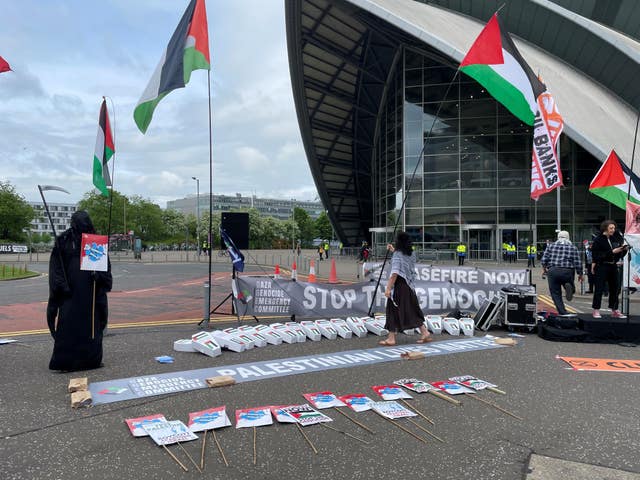Palestine and climate activists confront Barclays at chaotic shareholder meeting
Chairman Nigel Higgins was repeatedly interrupted as the meeting kicked off at the Scottish Event Campus in Glasgow.

Barclays faced a tense annual shareholder meeting as pro-Palestinian and climate activists accused the board of choosing “profit over people and planet”.
Chairman Nigel Higgins was repeatedly interrupted as the meeting kicked off at the Scottish Event Campus in Glasgow on Thursday.
The UK’s biggest bank has recently come under fire for its links to defence firms that produce equipment used by the Israeli Defence Force for its attacks on the Gaza strip.
Ahead of the meeting, dozens of protesters held a demonstration outside the AGM as they urged the bank to divest.
Two figures dressed as the Grim Reaper stood watch over lines of child-sized coffins alongside a sign reading: “Bankrolling genocide”.
The black-clad “oil slick” silent performers from Extinction Rebellion were among those taking part, along with the Gaza Genocide Emergency Committee, Scottish Palestine Solidarity Campaign, Christian Climate Action, Fuel Poverty Action, Scottish Friends of Palestine and Biofuelwatch.
Protesters listened to speeches and chanted “Barclays divest, we will not stop, we will not rest” as well as the pro-Palestinian “from the river to the sea” chant.
Jen Newall, a former climate scientist and now eco-strategist from Extinction Rebellion (XR) Scotland, said: “I’m speaking at this demonstration today to remind people of their power and their agency – encourage anyone who banks with or has shares with Barclays to look deep within and consider if they can really accept contributing to these issues by supporting Barclays and their awful track record.”

Inside the meeting, protesters immediately disrupted Mr Higgins’ opening remarks, standing up on chairs and shouting: “Blood on your hands” and “stop funding big oil”.
Security staff removed protesters from the room one-by-one as chief executive C S Venkatakrishnan spoke over the commotion about the company’s three-year plan to improve performance.
As the meeting moved onto shareholder questions, the board was asked about what action it has taken to end its financial ties to Elbit Systems, a firm supplying a range of weaponry to Israel.
Mr Higgins said he wanted to “put the record straight” about Barclays’ alleged investment in defence firms.
“The short answer is we don’t,” he said, explaining that clients of its wealth business may own shares but the bank itself is not an investor and only has a corporate banking relationship with Elbit’s independently-operated UK business.

Most questions focused on climate action, such as whether the board would commit to clean energy funding targets or end its financing of biomass firm Drax.
It comes after Barclays amended its climate change statement in February, pledging to no longer finance new fossil fuel projects and restrict its financing of “pureplay” companies.
But members of ShareAction, which campaigns for responsible investment, challenged the board about the exemption for pureplay firms working on short-term extraction projects, such as US fracking companies.
The charity coordinated a group of 24 investors, including Nest and the Church of England Pension Board, to pressure bank on tightening fossil fuel finance restrictions.
It also shared testimonials about issues with water quality from residents in New Freeport, Pennsylvania, where Barclay’s fracking client EQT Corporation operates.
In response, Mr Higgins said the bank’s strategy is to focus on activities that do not lock in long-term fossil fuel infrastructure.
“Investment is still required in short-cycle, short-lead time fossil fuel resources and that’s where we put fracking,” he said.
“The scope of our fracking policies are subject to enhanced due diligence to assess the environmental and societal impacts”.
Mr Higgins added that the bank does not think that restricting funding for US fracking companies “is consistent with supporting an orderly and affordable energy transition”.
A Barclays spokesperson added: “We recognise the importance of meeting current energy needs, while financing the scaling of the clean energy system of tomorrow to ensure energy is secure, affordable and reliable.”
On its website, the bank also said it recognises the profound human suffering caused by the conflict in Gaza.





